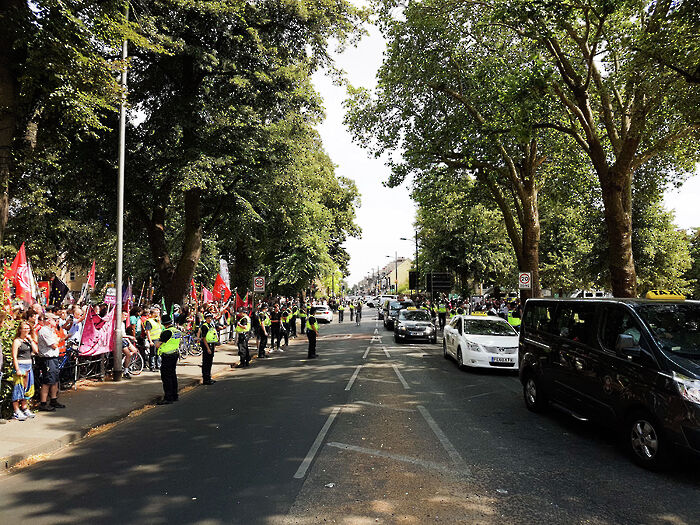Cambridge residents lead protest against Brazilian presidential candidate
Jair Bolsonaro has drawn widespread condemnation for his offensive, inflammatory comments

Around 30 people gathered in front of Senate House yesterday to protest Jair Bolsonaro, a candidate in the upcoming Brazilian presidential election. Currently leading in the polls, he has been widely criticised for sexist, homophobic, and racist comments.
The protest, organised as part of a movement called Mulheres Unidas Contra Bolsonaro (Women United Against Bolsonaro), was one of many held around Brazil and the world ahead of the election, the first round of which will be held next week, on 7th October.
The event began at 3pm as attendees, most of them members of Cambridge’s Brazilian community, arrived to make posters.

The group broke into chants of #EleNão (#NotHim), a popular anti-Bolsonaro slogan. The protest organisers led a roundtable discussion covering a number of topics, including how best to engage with Bolsonaro supporters and undecided voters.
After the discussion, a minute of silence was held to honour LGBT and black Brazilians and women killed by discriminatory violence. A special tribute was paid to Marielle Franco, a black, bisexual municipal councillor in Rio de Janeiro who was assassinated in March, sparking widespread demonstrations.
Bolsonaro has attracted condemnation for his inflammatory comments, including saying that he “would be incapable of loving a homosexual child”, that he was in favour of the military dictatorship that ruled Brazil from 1964 to 1985, and that he supports the use of torture.
In 2014, he told a congresswoman that “I wouldn't rape you because you don't deserve it,” later clarifying that he meant she was “very ugly”.

Flávia Regina Bueno, one of the organisers of the march, alongside political groups ‘mulheres contra Bolsonaro’ and ‘mulheres unidas contra Bolsonaro no exterior’, told Varsity that “this is the first time in the history of the country that women are protesting a candidate, and we are doing it because he is fascist, misogynist, racist, sexist, propagates hate speech, and does not have any real plan to rule the country.”
“He does not believe in global warming and science, and he has no actual plan to invest in education and research. He represents a step backwards, and his candidacy endangers democracy in the country.”
“For those reasons we, together with thousands of women, are echoing #EleNão in the hope that our voices are heard.”
Bolsonaro's comments have led some to compare him to President Donald Trump. His anti-abortion stance has brought him the support of millions of evangelical Christian voters in Brazil. He currently sits in the Brazilian Chamber of Deputies as a part of the country’s Social Liberal Party, representing Rio de Janeiro.
Just yesterday, in his first interview since being stabbed at a campaign rally on 6th September, Bolsonaro said that he wouldn’t accept any outcome of the upcoming election besides his own victory.
Following Bolsonaro in the polls for the first round of the election is Fernando Haddad, a candidate for the left-wing Worker’s Party (PT). The party, which was in power from 2003 to 2016, has a passionate support base thanks to its popular social programmes, but it is widely reviled because of its role in a corruption scandal and an economic contraction that have rocked Brazil.
- This article was updated to include the names of multiple groups involved in organising the event.
 Interviews / You don’t need to peak at Cambridge, says Robin Harding31 December 2025
Interviews / You don’t need to peak at Cambridge, says Robin Harding31 December 2025 News / Unions protest handling of redundancies at Epidemiology Unit30 December 2025
News / Unions protest handling of redundancies at Epidemiology Unit30 December 2025 Comment / What happened to men at Cambridge?31 December 2025
Comment / What happened to men at Cambridge?31 December 2025 Features / ‘Treated like we’re incompetent’: ents officers on college micromanagement30 December 2025
Features / ‘Treated like we’re incompetent’: ents officers on college micromanagement30 December 2025 Theatre / We should be filming ADC productions31 December 2025
Theatre / We should be filming ADC productions31 December 2025









